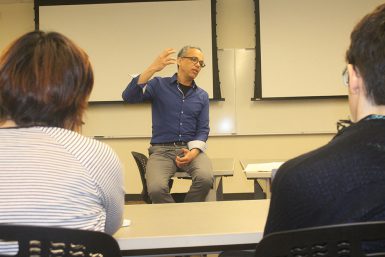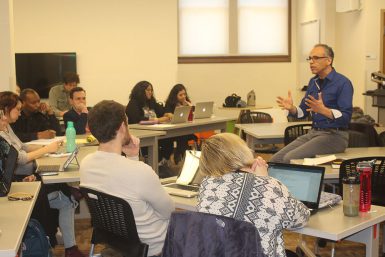Chaouli’s research finds the positives in criticism

Writing criticism of content is creating new content in itself, according Michel Chaouli, associate professor of German and director of the Center for Theoretical Inquiry in the Humanities. He discussed this concept in his talk, “Why Criticism Must Be Poetic,” Friday as part of the Media School’s weekly research series.
“The task of criticism is precisely trying to get to the essence of what the poetic is,” Chaouli said.
He used German poet Karl Wilhelm Friedrich Schlegel as an example. Schlegel argued that poetry can be criticized only by poetry.
“What does this mean?” he asked. “Should it be taken literally?”
Chaouli said scholars read interpretations of works as though they were mobile results not attached to the human associated with them, like subtracting Isaac Newton from the laws of physics.
But this, Chaouli said, is a fallacy.
“My hunch is that in properly humanistic work, this is not possible,” he said. “It is not possible to have some result or some insight or some theory that in a sense moves by itself.”
Chaouli said that the concept of self is intimately attached to an object and its criticism, and these items cannot stand alone.
“If my intuition is right, what we’re finally interested in is a transformation of self,” he said.
Chaouli said that in the United States, the idea of self in research is defined by identity politics. In this context, though, it can’t be summed up like that. For example, Chaouli can’t explain what draws him to writer Franz Kafka. Different individuals may be drawn to different things.
“Watch what others do. Perhaps you’ll pick it up,” he said. “Maybe you won’t.”
Ultimately, the process of criticizing can open up opportunities to collaborate and work with others. When humans are confronted with situations, they come up with questions and don’t always know how to proceed, Chaouli said.
This shareability allows people to make connections and can lead to self-discovery, but it also leads to questioning on an individual level, he said.
“There’s an element of opacity that marks this kind of work,” Chaouli said.
The difference between poetic criticism and poetry itself is subtle but worth noting, a distinction brought to attention by Ph.D. student Lucía Cores Sarria.

“You say that criticism is poetic, criticism of poetic work is poetic in itself,” she said. “How is it different from just producing the work of art?”
Chaouli noted that the concept of poetry in criticism does not necessarily divide poetic criticism and poetry as totally separate concepts; rather, it says that poetic criticism can simply bring new ideas to life.
“All it says is that there is an element of creativity, of newness, let’s say. Novelty,” he said. “If you don’t like the term ‘creativity,’ but novelty, that it is not foreseeable and that is not reproducible according to something. So that’s really the extent that I mean.”
They are also different concepts to the extent that people interpret them and understand them in different ways.
“They’re certainly distinct in the ways that we receive them, the way that we read them, the way that we encounter them,” he said. “They’re sociologically different.”
Ultimately, this act of questioning, criticizing and creating content is a key part of the academic world, Chaouli said. It can reveal something about individual works, but it can create something new as well.
“The entire apparatus of methods and theories that we have is not false or useless or a fraud, by any means,” Chaouli said. “But it doesn’t exhaustively describe what is actually most essential about what we do.”

